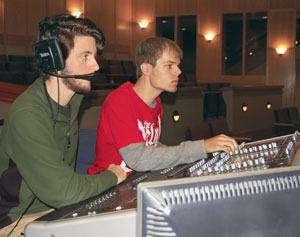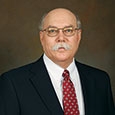When I was a high school director, only a few students had the desire to major in music and become a band director or performer. Many students were deeply interested in music but this wasn’t sufficient motivation to make a career of it. In later years I have wondered whether I might have done more to introduce them to alternative careers in music. I admit to being caught up in the next performance or competition, and never focused much on students’ career choices. I have also learned that this is typical of many high school directors. I believe that if teachers take just a little time to explore some of the alternative careers in music they can open doors for students.

Start With Listening
Any career in music requires acute listening, a skill that takes time and effort to develop. I teach a course that surveys American music, including classical, jazz, rock, country, and blues. Students from every major take this course, and at the end of the semester many say they did not realize how many kinds of music there are. Although the internet makes it easy to sample different kinds of music compared to my youth, when I had to search libraries for LPs, many students only listen to an extremely narrow niche of music.
Most students listen to music frequently, but usually it is just background noise to what they are doing at the time. To encourage students to listen thoughtfully, I may play an example and ask if it is a country song or a rock song. One way to decide is to analyze the background instruments and the way they are used. If there is a banjo or steel guitar, it is probably a country song. Also think about form. It could be a verse-chorus form, a 12-bar blues, or something else.
Criticism
The only way to develop an opinion on whether something is good or bad is to listen to numerous recordings and performances. I try to impress on students that an appreciation of beauty will change over time based on cumulative experiences. I made a recording with one of my high school bands 30 years ago that I thought was excellent at the time, but now I hear it differently. Discussion of aesthetics can turn into an in-depth philosophical debate, but it is worth the time because so many students have never discussed it before. Exploring what beauty means is a foreign concept to most. It’s hard to get students to think in terms of beauty and emotion, but these are important when evaluating performances.
I used to set aside rehearsal time for students to play recordings by favorite artists and describe the music in terms of melody, harmony, rhythm, timbre, and form. I also often recorded the band during rehearsal and then played it back for students, asking them to comment as a competition judge might.
I used to hand out sample judge’s sheets and ask my high school students to evaluate themselves. We would record ourselves performing the competition show, and I would assign some of the section leaders to evaluate it using an adjudicator sheet. They would discuss what the band could improve upon, and sometimes they would predict what the judges would say. In addition to teaching students to think critically about performance, it also makes them feel more responsible about their contributions to the ensemble.
Another way to get students to think more deeply about music is to have them write about performances. Directors could assign a short paper in which students either assess one of their own performances or review a recent album or concert. Spend time before the assignment teaching students correct musical terms to use in lieu of slang expressions. A key goal of this assignment is for students to go beyond simply liking or disliking a piece of music or a performance and instead make intelligent observations, supporting their opinions with specific evidence, not with broad descriptions. For example, students should write, “the electric guitar’s harmony overpowered the singer,” instead of simply “the electric guitar was too loud.” Stagger the due dates by sections and be sure to include a minimum and maximum page requirement to make grading easier. Students with especially good papers should submit them to the school or local newspaper.
As students become more comfortable talking about music this way, have small groups formally present previews of upcoming area concerts in class. In addition to information about the ensemble and the names of the pieces, students should research the historical background of the pieces and composers and interview conductors and performers about programming choices. Recordings, PowerPoint presentations, and handouts can enhance these presentations immensely. I notice that students enjoy the concerts more when they do previews because they know what to expect.
Putting Students to Work
Students can explore elements of concert production by helping with sound, staging, and lighting in school performances. Students should also become familiar with ensemble staging, acoustics, and aspects of architectural design in their school’s performance facility. Once students learn the basic functions of the sound and lighting systems, those who become interested can learn about finer aspects of production, including sound mixing and microphone placement, by helping with school instrumental and choral events, theater productions, and other similar activities.
Guests and Field Trips
Invite professionals to record school concerts and explain recording techniques and equipment to the students, or consider a field trip to a local recording studio and arrange for a jazz ensemble or other small group to make an in-studio recording while other students observe. Also invite the owners or employees of local music retailers to speak to your students or visit a full service music store with a repair shop that sells instruments and sheet music to introduce students to these aspects of music.
Lead a field trip to a performance on a college campus or a professional venue and arrange for the venue’s production personnel to give a tour of the hall and overview of concert logistics prior to the event. A visit to a local venue can also include meeting the arts administrators to have an introduction to publicity, scheduling, and other aspects of management. Following this, directors could form student committees to manage school productions by submitting press releases to local newspapers and radio stations, creating concert programs, maintaining a band or orchestra web site, and helping to prepare the stage before performances.
One of my colleagues uses Skype to have video conferences in class. He used to work in Los Angeles, and he has former colleagues talk about audio technology instead of paying to have them fly from California to speak.
A recording industry professional could explain the basics of copyright, mentioning licensing organizations, such as ASCAP, BMI, SESAC, and The Harry Fox Agency. This might also be a good time to share information about other legal aspects of the music world, including entertainment lawyers and contracts.
Articles from magazines, journals, newspapers, and web sites can be excellent ways for students to learn about music and music careers. Students should not only read about music and performances, but also current events in the music world to expose them to the business and politics as well as the music itself. Post articles periodically on the rehearsal room bulletin board or the music department’s web site, and occasionally discuss them in class to encourage students to read them. These are just a few ways to introduce students to additional careers in music and help them develop the broad background and necessary skills they can use as a foundation for future career choices in the field of music.
Careers in Music
Music Business
Music Attorney – specializes in music contracts, copyright, and licensing.
Business Manager – handles an artist’s financial arrangements including taxes and investments.
Advertising Executive – creative person with strong sales and marketing skills who develops ad campaigns for a record label or publisher.
Booking Agent – contacts venues to find performance opportunities for artists.
Publicist – a person with strong writing and communication skills who coordinates interviews and media relations for an artist.
Music Production and Technology
Music Producer – oversees recording sessions, working with artists, backup musicians, music arrangers, and recording engineers to create a final product.
Sound Technician – travels with the road crew to set up equipment and run sound checks before performances.
Recording Engineer – operates the sound board and oversees all recording equipment in the studio.
Mastering Engineer – puts the finishing touches on a recording by balancing the component tracks.
Sound Designer – acquires, creates, and manipulates audio for recordings, performances, theater, film, and computer games.
Music Publishing
Music Editor – selects and prepares printed music, articles, images, sound, and video for publication.
Music Critic – a combination of musician and journalist who influences the public’s choices by critiquing performances and new recordings.
Movie, Television, and Radio
Music Supervisor – finds music for films, television programs, and radio programs and works with directors, producers, and composers to make decisions on soundtracks and background music.
Film or Television Music Editor – assists composers in compiling and editing a soundtrack.
Program Manager oversees all programming decisions at a television or radio station.
Disc Jockey – personable individual with a clear speaking voice who introduces music, commercials, and news on-air.
Music Video Producer – individual who is well versed in aspects of music business, video production, visual design, computer programming, graphic arts, and communications.
Arts Organizations
Arts Administrator – manages the business side of running an arts organization.






